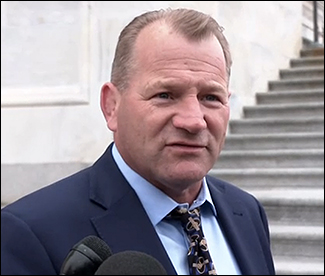By Jim Ellis — Thursday, Dec. 11, 2025
Texas Elections
The old saying, “you can’t tell the players without a scorecard,” certainly applies to the 2026 Texas federal office slate. Now that candidate filing is closed, the clouded political situation is becoming a bit clearer.Texas has a unique filing system that makes following which candidate is running where confusing. Instead of filing with a government agency, the candidates file with their political party. Yet, the process is further complicated.
Candidates filing for offices where the jurisdiction covers more than one county turn their qualifying documents in to their state party office. If a district is fully contained within a single county, the candidates file with their county political party. Once the paperwork is received, the political party entities eventually report the qualified candidates’ names and particulars to the Secretary of State. Therefore, the process takes longer to determine who will be on the ballot than it does in most other states.
In the Senate race, we now have a clear picture for the March 3 partisan primaries. For the Republicans, amidst minor candidates the three major participants, Sen. John Cornyn, Attorney General Ken Paxton, and Rep. Wesley Hunt (R-Houston), are vying for the party nomination. This race is expected to be close and moving toward a runoff, which is necessary if no candidate receives majority support in the first vote. At this point, it appears that Sen. Cornyn and AG Paxton will advance to the secondary election.
For the Democrats, we see a battle between Rep. Jasmine Crockett (D-Dallas) and state Rep. James Talarico (D-Austin). Five minor candidates have filed, and it is unclear just how many will qualify for the ballot. Irrespective of these latter candidates’ presence, it is likely that we will see either Rep. Crockett or state Rep. Talarico claim the party nomination on March 3.
In the House delegation, 11 seats are open with the addition of TX-30, the seat that Rep. Crockett is leaving to run statewide. It appeared that Rep. Marc Veasey (D-Ft. Worth) would move into that district, but he surprisingly chose not to file. Instead, Veasey decided to run for Tarrant County Judge (Executive) where he will face a Republican incumbent and other significant candidates.
The Veasey move allows Rep. Julie Johnson (D-Farmers Branch), who sees her 32nd District transform into a Republican domain and stretch into East Texas, to run in District 33, which is fully contained within Dallas County. Her major obstacle to winning a second term in Congress is former Representative and 2024 US Senate Democratic nominee Colin Allred. Though announcing for the Senate in October, Allred instead changed his mind at the last minute and filed to return to the House, this time in District 33. Also in the race is former state Representative and ex-Dallas City Councilman Domingo Garcia. Therefore, the top two candidates falling into a runoff becomes a possibility. The eventual Democratic nominee will easily win the seat in the general election.
Another new development is the return to the political wars of former Congressman Steve Stockman (R). He has filed in new open District 9. Stockman was twice elected to Congress in non-consecutive elections. He was convicted of violating certain financial laws, but President Trump commuted his 10-year prison sentence. The other major candidate within the crowded field is state Rep. Briscoe Cain (R-Deer Park).
With 11 filed candidates in the CD-9 race, advancing to a runoff election is probable. It remains to be seen how many of the filed candidates qualify for the ballot. Under the new redistricting plan, the 9th District should be one of the seats that Republicans gain.
Another surprising move came in Houston’s 18th District. This seat is currently in special election mode, with Harris County Attorney Christian Menefee (D) and former Houston City Councilwoman Amanda Edwards (D) vying to replace the late Congressman Sylvester Turner (D). Immediately after the special election, it was thought the winner would then face Rep. Al Green (D-Houston) in a battle for the new 18th District. The regular primary is scheduled for March 3 after a special election winner is declared on Jan. 31.
Only Menefee, however, filed in new District 18. Therefore, should Edwards win the special election, she will only serve the balance of the current term. Win or lose on Jan. 31, Menefee will advance into the regular Democratic primary against Rep. Green.
The truly surprising facet from the Texas congressional filings is the fact that only two state legislators, Cain and state Rep. John Lujan (R-San Antonio; open new District 35), entered one of the 11 open-seat congressional campaigns. Therefore, the Texas delegation will feature a large number of incoming freshmen entering the House with no legislative experience.







